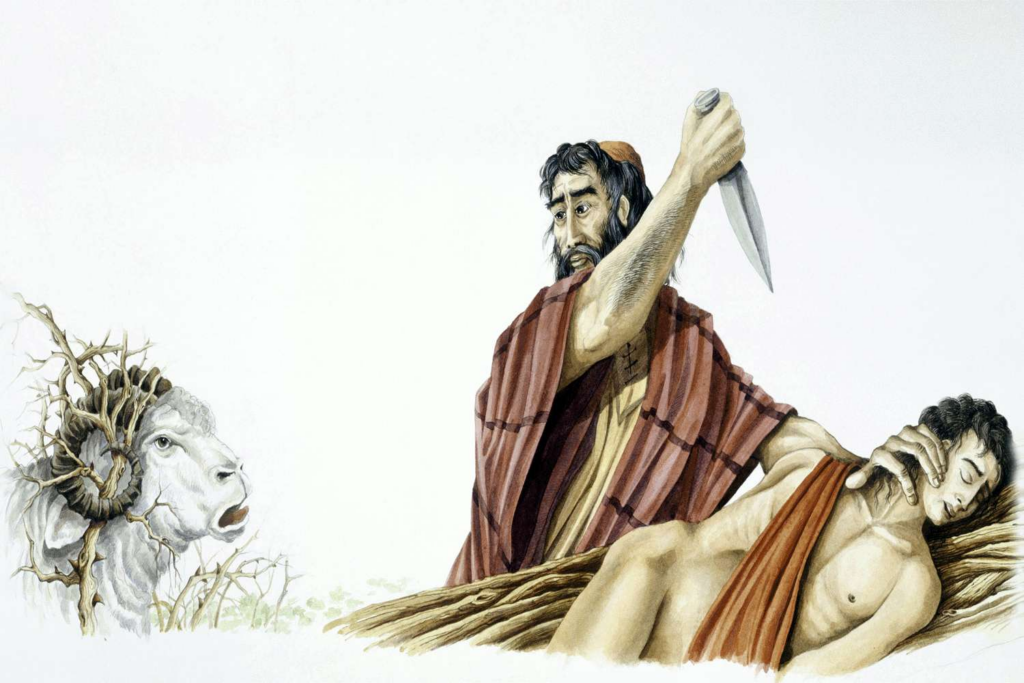The story of Abraham and Isaac is a significant and deeply thought-provoking narrative found in the Bible, specifically in the book of Genesis. It revolves around the patriarch Abraham and his son Isaac and highlights themes such as faith, sacrifice, and obedience.
The story begins with God testing Abraham’s faith. God commands Abraham to take his beloved son Isaac and offer him as a burnt offering on Mount Moriah. This request poses a tremendous challenge for Abraham, as he had long-awaited the birth of Isaac, seen as a miracle in his old age.
Despite the anguish and conflict within himself, Abraham chooses to submit to God’s will,
The story of Abraham and Isaac is one of the most well-known and profound narratives in the Bible. It’s a tale of faith, obedience, and divine providence that has captured the hearts and minds of believers for generations. In this blog post, we will delve into the story of Abraham and Isaac, exploring its significance, the moral and spiritual lessons it imparts, and its enduring legacy.
What is the moral lesson Of Abraham’s covenant
- Faith and Obedience: Abraham’s willingness to follow God’s command, even in the most challenging and heart-wrenching circumstances, serves as a remarkable testament to faith and obedience. This story emphasizes the importance of trusting in God’s plan, even when it seems unfathomable.
- Divine Providence: The narrative illustrates God’s providential care. Just as Abraham is about to carry out the unthinkable, God provides an alternative sacrifice, reaffirming His mercy and faithfulness.
- The Foreshadowing of Christ: The story is often seen as a foreshadowing of the sacrificial nature of Jesus Christ. In Isaac’s willingness to be sacrificed and God’s provision of a substitute, there are echoes of the ultimate sacrifice made by Jesus on the cross for the sins of humanity.
- Testing and Growth: Abraham’s test of faith served as a crucible for spiritual growth. It deepened his relationship with God and solidified his role as the father of faith for generations to come.
Churchgists is always committed to offering you all the details you need on Abraham and Isaac: A Profound Test of Faith in the Bible, Abraham And Isaac Story In The Bible, A Picture of Christ I trust that when you done with this article you will be well grounded on this subject matter.
What does the story of Abraham teach us about God?
God doesn’t mince words. God knew just how precious Isaac was to Abraham, having had to wait until he was 100 years old to have him. It would be far less of a test of Abraham’s faith if the sacrifice didn’t mean much.
LESSON #1: The greater the cost, the greater the sacrifice.
The story continues in verse 3.
“Early the next morning Abraham got up and loaded his donkey. He took with him two of his servants and his son Isaac.”
Two things strike me about this. The first is that Abraham had all night and morning to be terrified about the coming events… and to talk himself out of it.
Ever had a deadline that you dreaded? Root canal. Sending your child off to college. A firing.
At least with those events, you knew the reason behind them. Abraham was given no explanation. He was just told to do it, plain and simple.
LESSON #2: Sacrifice doesn’t always come with answers.
The altar got built but still no lamb. Now if I’m Abraham, I’m facing a crisis of belief. Where’s the help? Where’s the provision? Where’s the relief?
Not Abraham. He continues in obedience:
“He bound his son Isaac and laid him on the altar, on top of the wood. Then he reached out his hand and took the knife to slay his son.”—Genesis 22:9–10
Imagine the anguish and horror in that moment. Envision reconciling the internal conflict of sacrificing someone you love for someone you love more. Your knife is raised high and ready to cut short the life of someone so important to you.
Of course, we know the story doesn’t end there. God interrupts:
LESSON #3: Godly obedience should be swift.
Next, we read in verse 5 that Abraham tells his servants:
“Stay here with the donkey while I and the boy go over there. We will worship and then we will come back to you.”
Notice that Abraham says “we” will come back to you after worshipping, meaning he and Isaac. Abraham believed the Lord would salvage the situation.
We see this faith displayed again when Isaac asks his dad where the lamb was:
“Abraham answered, ‘God himself will provide the lamb for the burnt offering, my son.’”—Genesis 22:8

Abraham and Isaac: A Profound Test of Faith in the Bible
The Story of Abraham and Isaac:
The narrative of Abraham and Isaac is primarily found in Genesis 22:1-19. It begins with God’s extraordinary command to Abraham, a man deeply revered for his faith and obedience. God instructs Abraham to take his beloved son, Isaac, to the land of Moriah and offer him as a burnt sacrifice.
The account unfolds with Abraham’s unwavering obedience to God’s command. He embarks on the journey with Isaac, demonstrating his faith and trust in the divine plan. As they reach the designated place, Abraham prepares the altar and binds his son, fully intending to carry out God’s command.
However, in a moment of divine intervention, an angel of the Lord stops Abraham and provides a ram caught in a nearby thicket as a substitute sacrifice. The angel reaffirms God’s blessings upon Abraham for his unwavering faith and obedience.
Enduring Legacy:
The story of Abraham and Isaac continues to be a source of inspiration, serving as a reminder of the profound relationship between faith and obedience. It challenges believers to trust in God’s providence, even in the face of seemingly insurmountable challenges. The lessons of this narrative are timeless and continue to resonate with those seeking to deepen their faith and understanding of God’s plan.

A Promised Son
Genesis tells us that God had promised Abraham and Sarah a child. As they grew old and Sarah remained barren, they doubted God’s promise, but He had not forgotten them. When Abraham was 99, Sarah conceived and bore a son named Isaac, which means “laughter” —because each of them laughed when they learned they would have a child in their old age. God promised Abraham that He would continue His covenant with Isaac, and that he would have many descendants through this promised son.
Command to Sacrifice
One day when Isaac was a boy, God came to Abraham and told him to sacrifice Isaac on Mt. Moriah. Though he loved his son dearly, he did not hesitate to obey the Lord. The very next day, Abraham saddled his donkey and began the journey, with Isaac, two servants, and wood for the sacrifice. As they neared the mountain, Abraham instructed the servants to stay behind, while he and Isaac ascended. Genesis 22:7-8 describes the conversation between father and son as they climbed the mountain:
Isaac spoke to his father Abraham. “Father!” he said. “Here I am,” he replied. Isaac continued, “Here are the fire and the wood, but where is the sheep for the burnt offering?”
“My son,” Abraham answered, “God will provide the sheep for the burnt offering.” Then the two walked on together.

The Lord Provides
They came to the place where God had told him to go and built an altar. Abraham bound Isaac, arranged the wood on the altar, and drew his knife. But at that moment, an angel stopped him. Genesis 22:11-12 describes:
But the angel of the Lord called to him from heaven, “Abraham, Abraham!” “Here I am,” he answered. “Do not lay your hand on the boy,” said the angel. “Do not do the least thing to him. For now I know that you fear God, since you did not withhold from me your son, your only one.”
Abraham noticed a ram caught by his horns in the thicket nearby and offered it to the Lord instead. He called the place “Yahweh-yireh” meaning “the Lord will provide.” After the sacrifice, the angel spoke again to him, saying that he would be blessed for being willing to give all that he had to the Lord, as Genesis 22:16-18 relates:
“I swear by my very self—oracle of the Lord—that because you acted as you did in not withholding from me your son, your only one, I will bless you and make your descendants as countless as the stars of the sky and the sands of the seashore; your descendants will take possession of the gates of their enemies, and in your descendants all the nations of the earth will find blessing, because you obeyed my command.”
Abraham’s Faith
At first glance, the story of Abraham and Isaac seems disturbing. Why would a loving God ask Abraham to sacrifice his only son in a manner similar to his pagan neighbors? Was He bringing unnecessary torment to a man who had already waited so long for a child?
Upon closer inspection, it’s clear that God’s request to sacrifice Isaac was not unloving or capricious. Instead, it is a beautiful picture of Abraham’s faithfulness and God’s provision. In the past, Abraham had doubted God. He had tried to have children in his own way instead of waiting on God. By asking him to sacrifice Isaac, God was testing Abraham to see if he trusted Him.
And he did: Abraham’s faith in God was so great that he was willing to give Him his only son, trusting that God could bring him back from the dead. When he and Isaac left to go up to the mountain, Abraham said to his servants, “we’ll come back to you.” And Hebrews 11:17-19 reveals:
By faith Abraham, when put to the test, offered up Isaac, and he who had received the promises was ready to offer his only son, of whom it was said, “Through Isaac descendants shall bear your name.” He reasoned that God was able to raise even from the dead, and he received Isaac back…

In return, God promised to make his offspring as many as the stars.
Like Abraham, we should have confidence in God, trusting Him with everything and being willing to sacrifice our best to Him. Though we may not fully understand His plans, He, in His providence, supplies all our needs. All He asks is that we have a willing heart.
A Picture of Christ
The story of Isaac is both a picture of Abraham’s willingness to sacrifice his only son and a foreshadowing of God’s willingness to sacrifice His only Son for us. Abraham says, “God will provide the sacrifice.” Not only did God provide a ram as a sacrifice for Abraham, but He provided a lasting sacrifice through His Son — for Abraham, and for all of us.
Though Jesus did not deserve to die, God made Him the sacrifice to wash away our sin. We can trust God with everything He has given us, because He did not withhold anything from us, as John 3:16-17 states:
For God so loved the world that he gave his only Son, so that everyone who believes in him might not perish but might have eternal life. For God did not send his Son into the world to condemn the world, but that the world might be saved through him.
Conclusion
The story of Abraham and Isaac is a powerful testament to faith, obedience, and God’s providence. It remains a cornerstone of biblical literature and serves as a guiding light for believers, challenging them to trust in God’s divine plan and providential care, no matter how daunting the circumstances may seem. It is a narrative that encapsulates the essence of unwavering faith and the transformative power of divine intervention.